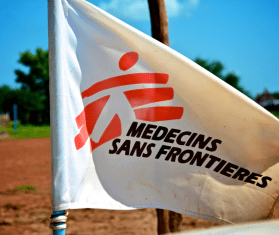Para leer este articulo en Español, visite aqui.
San Juan/New York— The international medical humanitarian organization Doctors Without Borders/Médecins Sans Frontières (MSF) has completed its COVID-19 emergency response in Puerto Rico, providing medical and humanitarian assistance to people neglected by the health system. MSF’s work offering home-based care and COVID-19 monitoring for people isolated at home will continue with the newly formed organization, Puerto Rico Salud, which was created by a group of MSF’s Puerto Rican staff.
“We set up a unique, medical outreach consultation program to be able to travel to remote areas to visit isolated communities and assist people living on the margins,” said Sophie Delaunay, MSF’s project coordinator in Puerto Rico. “This program became known to the communities. As MSF closes its program, we are relieved to know that our staff will continue this work through their new organization, Puerto Rico Salud, so that our patients will receive follow-up care and new patients will have care when needed.”
MSF’s home-based care program, designed to serve people neglected by the health system, saw more than 1,200 patients since it began in mid-June. Most patients were older adults suffering from chronic conditions, such as diabetes and hypertension—two underlying medical conditions that increase the risk of serious COVID-19 complications. Each day, a team comprised of a doctor and a nurse traveled to a different designated area to go door-to-door, treating patients inside their homes, at their doorstep, or at a pop-up clinic.
MSF’s COVID-19 monitoring program consisted of a 14-day check-in system for people who tested positive and had mild or moderate symptoms, or those who were asymptomatic. Patients self-enrolled in MSF’s cell-phone-based monitoring program. An MSF nurse checked in with each patient daily to review vital and danger signs, and to provide health education on the virus, transmission, symptom management, and how to isolate and keep their households safe. If symptoms became serious or patients needed medication, they were referred to a hospital or a primary care doctor. MSF medical staff also monitored the psychosocial health of patients during this period.
MSF first responded to the COVID-19 outbreak in Puerto Rico in mid-May, distributing 30,000 items of personal protective equipment (PPE) to hospitals and care facilities. Simultaneously, it began conducting infection prevention and control (IPC) and “Training of the Trainers” trainings. MSF delivered 11 IPC trainings in eight health care facilities for 100 participants. During this time, MSF also carried out Psychological First Aid Training (PFA) for 20 participants from health institutions and local organizations.
Additionally, MSF prepared 5,000 hygiene kits to give to people experiencing homelessness and others living in poor or isolated communities, and conducted health education sessions with vulnerable communities, including commissioning murals to promote safety measures such as wearing masks, washing hands, and quarantining.
“MSF’s programs were carried out in close collaboration with well-established community-based organizations and local health providers,” said Delaunay. “And because of that, we were able to be swift and impactful.”
MSF partnered with community leaders from San Juan, Loíza, Arecibo, Ciales, Ponce, Utuado, Humacao, Yabucoa, and Vieques to reach patients in remote and isolated areas. MSF partnered with many local organizations, including Taller Salud, a group focused on improving women’s access to health care, and Coalicion de Coaliciones, an organization serving people experiencing homelessness in 54 municipalities.
“We know that the crisis is not over and that many people in Puerto Rico do not have adequate access to health care,” said Delaunay. “COVID-19 has exposed many issues that need to be addressed so that people who get sick, whether from the virus or other illnesses, can access medical care. We close our program with a sense of reassurance that the very next day after MSF leaves, our former medical staff through their newly formed group, Puerto Rico Salud, will continue this lifesaving work.”
Everywhere we work, MSF has seen how this pandemic is affecting vulnerable and marginalized communities. MSF is ensuring that all of its projects are COVID-19-ready while keeping a priority on its other essential medical programs. In the United States, MSF carried out several COVID-19 programs, all of which have now closed, including for migrant farmworkers in Florida, people experiencing homelessness in New York, the elderly and residents in nursing homes and care facilities in Michigan and Texas, vulnerable and marginalized people in Puerto Rico, and working with Native American communities in the Navajo Nation and Pueblos.




